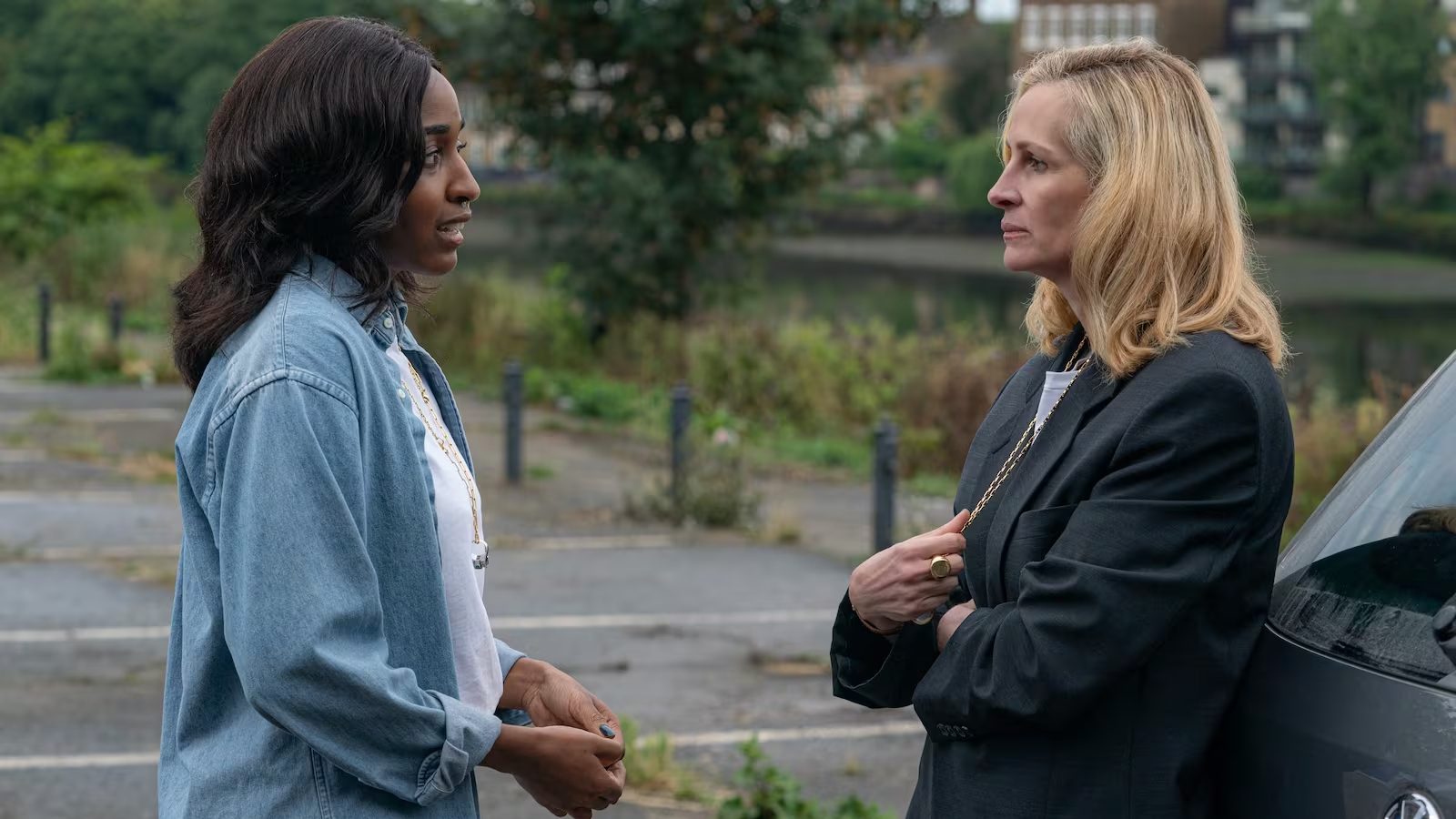PICK OF THE WEEK
After the Hunt (selected cinemas)
At the end of the London Film Festival preview of Luca Guadagnino’s new movie that I attended, you could have heard a pin drop. Nobody in the audience knew quite how to react to what they had just seen. This is one of After the Hunt’s many strengths.
Julia Roberts has rarely been better than as Alma Imhoff, a philosophy professor at Yale who is seeking tenure; and doing her best to conceal the pleasure she derives from being the focus of something approaching a cult of personality among her colleagues and doctoral students.
Hank (Andrew Garfield), a younger, brash professor, is after tenure too, and, in his friendship with Alma, oscillates between desire and competitive resentment. Among her pupils, Maggie (Ayo Edebiri) is the most devoted and considers her idol to be a friend. Why, then, does she go snooping for something incriminating when Alma and her psychoanalyst husband Frederik (Michael Stuhlbarg) throw a boozy soirée at their elegant home?
All the superficial intellectual fellowship collapses when Maggie turns up at Alma’s door, soaked to the skin, to tell her that Hank sexually assaulted her after the party. Instead of unconditional support, Alma’s response is strikingly hedged, and Maggie is furious. “He crossed the line!” she says, appalled that her mentor appears to be reserving judgment.
Thus, without the slightest qualm, does After the Hunt go storming into the minefield of the culture wars. Hank is summarily fired and no less angry than Maggie that Alma did not support him (he claims he is being framed for accusing Maggie of plagiarism). Because Maggie is Black and queer, her case instantly becomes a campus parable of intersectional politics. Her parents are also big donors to the university, which naturally infuriates her detractors.
The shifts of power are compelling to behold, as Alma struggles not to disintegrate in public (she is also suffering from a mysterious stomach ailment and steals prescriptions from a colleague to medicate herself). Only Frederik, acting like a Greek chorus, dares to speak the truth to her – not that she is listening.
After the Hunt parades its erudition unashamedly, from Alma’s early citation of Michel Foucault’s Discipline and Punish (1975) – “a picture of public torture performed in order to maintain the social contract” – to Theodor Adorno’s Minima Moralia (1951), via the unfinished paperback copy of Thomas Mann’s Buddenbrooks (1901) on her bedside table.
There is plenty of intergenerational tension as older faculty members struggle with their pupils’ social justice ideologies. “Don’t you have some obscure protest to be publicly angry at?” Alma yells at Maggie and her non-binary partner Alex (Lio Mehiel). She and her friend Kim (Chloë Sevigny) marvel cynically at the daring of a bar that is playing the politically controversial Morrissey – until they realise that the track in question is by The Smiths and therefore (probably) passes the purity test.
Even the font in which the opening credits appear – white Windsor Light against a black background – is a provocation, being the style long favoured by Woody Allen in his movies. Set in 2019 (with a very unexpected coda in 2025), After the Hunt has predictably been interpreted as an exercise in social commentary (Michelle Goldberg condemned it in the New York Times as an act of “reactionary centrism”).
But Guadagnino, as anyone who has seen Call Me By Your Name (2017), Bones and All (2022) and Queer (2024) can attest, is as subtle a director as he is audacious. His new movie is not an attack upon or a defence of wokery; but an exploration of the universal themes of self-deception, power imbalance, vengeance, transgressive desire and resilience.
It is no accident that one of its most memorable moments involves the story of Odysseus or that the music, by Trent Reznor and Atticus Ross, is so primal and full of mythic dread. Beneath the polished surface of Ivy League confidence lurk elemental passions, perfidies and doubts. After the Hunt easily transcends its contemporary source material; unsettling, bold and riveting.
FILM
Frankenstein (selected cinemas; Netflix, November 7)
Speaking of Andrew Garfield, the former Spider-Man was originally cast to play the creature in Guillermo del Toro’s much-anticipated adaptation of Mary Shelley’s classic novel – but, due to a scheduling clash, had to drop out. In a moment of inspiration, the Oscar-winning director offered the role to Jacob Elordi – whose extraordinary performance is the highlight of his epic, visually sumptuous movie.
As Victor Frankenstein, Oscar Isaac is Byronic in his testosterone-packed swagger and Promethean in his intellectual arrogance: determined to eclipse his cold-hearted father, Baron Leopold Frankenstein (Charles Dance), a distinguished doctor, by conquering death itself. “Galvanism” – the electrification of dead tissue – was indeed a field of medical experimentation in Shelley’s day; but Victor takes the idea a lot further, with no care for the moral consequences of what he is doing.
In Heinrich Harlander (Christoph Waltz), an arms dealer making a fortune from the Crimean War, he finds a bountiful benefactor, whose generosity reflects a dark secret. His laboratory in an ancient Scottish tower, built by production designer Tamara Deverell, is a breathtaking cavern of demented scale and unchained ambition.
In Victor’s scientific triumph lurks his personal doom, of course – as becomes quickly apparent to his brother William (Felix Kammerer) and his fiancée Elizabeth (Mia Goth). When she finally encounters the creature, kept in chains in the dungeon, her response is not horror but tender empathy; which awakens in him – or “it”, as Victor insists – a sense of burgeoning identity and a yearning for his own companion.
Elordi is simply phenomenal, deploying his lanky physique and ever-expanding range as an actor to transform the notional monster into the film’s emotional heart. Victor has bequeathed to him what he calls “merciless life”. Is it anything but a curse?
To enrich your enjoyment of this operatic horror movie, don’t miss the splendid exhibition in its honour, Frankenstein: Crafting a Tale Eternal, at The Old Selfridges Hotel in London until November 9. Book your free ticket on the Selfridges website.
FILM
Michael Haneke: A Curzon Collection (Blu-ray)
I am a cultural prepper: which is to say that, as much as I love the streaming platforms and the golden age of prestige television that they have made possible, I don’t trust their algorithms and subscription-based business models to keep classic, arthouse and world cinema available online.
So: don’t throw away those Blu-rays and DVDs and keep an eye open for the best releases – of which this is an outstanding example. In The New Biographical Dictionary of Film, the great David Thomson writes that Michael Haneke, now aged 83, “may be the best filmmaker at work today”, and this 14-disc collection more than vindicates that verdict.
Alongside all his feature films – including the two winners of the Cannes Palme d’Ors, The White Ribbon (2009) and Amour (2012) – are five titles made for television that provide fascinating insights into his evolution as an auteur. From the start, the debt to Ingmar Bergman is unmistakable, especially in Lemmings (1979) and Variation (1983); as is the literary influence of many great authors, including Franz Kafka and Joseph Roth.
The juxtaposition of the Austrian and US versions of Funny Games (1997 and 2007) is instructive. The German-born Haneke has always maintained that his sole intention in remaking the original was to tell the story to a larger, English-language audience – but, almost 20 years on, it is clear that the theme of home invasion and violated privacy scratched at his artistic imagination, as though he intuited both the imminent intrusions of digital surveillance and the perils of hypermodern violence. In its apocalyptic vision, Time of the Wolf (2003) also set a standard that many have tried to match – mostly failing.
There is a host of terrific commentaries and extras, too. A perfect Christmas gift for the cineaste in your life; and a must for the cultural bunker.
STREAMING
The Diplomat, season 3 (Netflix)
Spoilers ahead. So CJ is president and Josh is married to her…? No, wait, wait: that was The West Wing. This is a welcome return for Debora Cahn’s hugely entertaining thriller series, in which (in an undoubted wink to fans of Aaron Sorkin’s classic series) Allison Janney plays the newly elevated President Grace Penn and Bradley Whitford is her husband Todd, introducing himself as “first lady”.
Season two ended with the death of Penn’s predecessor, President Bill Rayburn (Michael McKean), killed by a heart attack brought on by the discovery that Penn had been implicated in a dastardly false flag operation to implicate Russia in a lethal attack on the British aircraft carrier HMS Courageous. In a wicked twist, this elevates the treacherous Penn to the most powerful office on earth.
Surely, then, the star of the show, Kate Wyler (Keri Russell) – notionally US ambassador to London, but really the incarnation of action-packed American decency in a non-Trumpian parallel universe – will now be appointed vice-president? Not so fast. Penn taps Kate’s husband Hal (Rufus Sewell) instead.
Though officially second lady, Kate opts to stay in post in London, to keep an eye on the irascible prime minister, Nicol Trowbridge (Rory Kinnear) and what Hal calls “the little island that couldn’t” (plenty of Brexit shade in this season). Estranged from her husband, she begins a passionate affair with British spy Callum Ellis (Aidan Turner) – who has uncovered yet another secret that may trigger geopolitical disaster.
The series hinges on Russell’s excellent performance as a plausible hero: always under stress, always on the move but always the smartest person in the room. Will she end up as president herself? Season four is already in the works.




